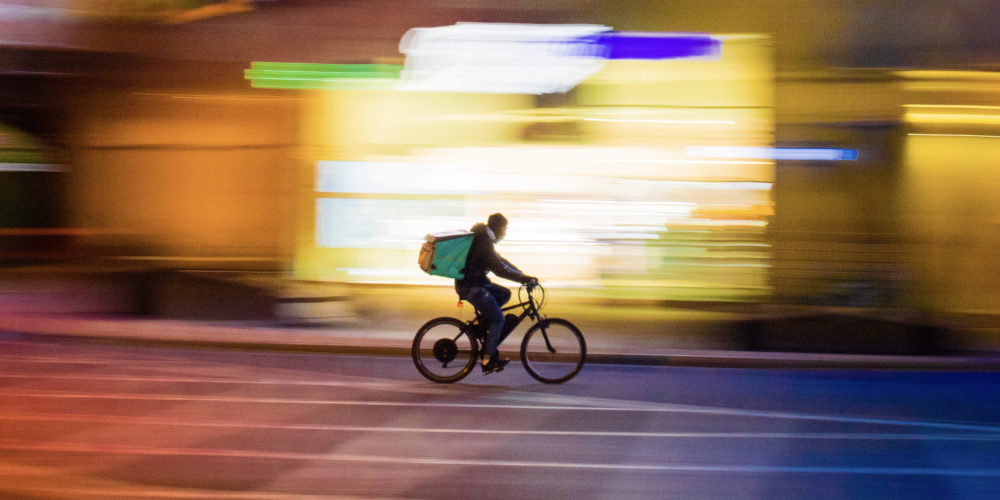Clouds, kitchens and landlords – a lesson in strategy

I first mentioned “cloud” kitchens on this page exactly two years ago. Also called “dark” or “ghost” kitchens, these are are stripped-down operations that produce for delivery only – no service, no waiters. They use data to understand what is most in demand, where, and when – and they locate to serve that demand.
The COVID-19 pandemic has brought this new creature into sharp focus. As millions more people have tried home food delivery and become used to it, the food game has changed dramatically – perhaps forever.
But first, let’s go back in time. When most people were going out to eat, the restaurant business was a great one to be in, right? Wrong. It’s never been a great business, except for a very small group of operators. Why is that? People gotta eat, no? Demand for cooked food is huge in the world, so why not get into the game?
To answer that question, ask yourself this: who makes the money in the restaurant or coffee-house trade? If a customer pays ten dollars or a thousand bob for a meal, where does most of that money go? Not to the employees, who mostly work at close to minimum wage. Not to the restaurant owner, who is competing with dozens of other restaurants in the near vicinity. Who, then?
The answer is hidden in plain sight. The landlord!
Yes, the owner of the mall or building housing the eatery clocks most of that ten bucks. Why so? Because in physical dining, location is key. Footfall must occur, and restaurants must locate themselves in places that are busy with human traffic, or convenient to access for a large number of diners. That’s why clusters of restaurants are found around the best locations. They all have to be there because that’s where the diners are; and they end up competing with all their neighbours for customers – and staff.
That’s why the landlords take home most of the money – because great real estate is really scarce.
That there is the hidden lesson of strategy: if what you have or do is scarce, and really needed by the world, you win. If what you offer is also offered by a posse of lookalikes, you will only ever make average earnings.
Distinction in the offering yields distinction in the returns.
And so restaurant owners, cooks, waiters et al will not earn anything outstanding – unless there is distinction in what they offer. Really special food and really special service do earn rewards – as long as the “really” in that sentence is real, and not a delusion.
But wait: that was the past. The coronavirus may have brought a lasting structural change to the industry, if location is no longer the crucial ingredient in restaurant success. If many folks will continue to use delivery apps for their food, then the real scarcity moves elsewhere: to the data, the platform, and the brand.
Who now holds the data and owns the customer relationship? The delivery apps. Those are the new landlords. That’s why they can ask for as much as thirty per cent of order value as their take – and most restaurants cave. Restaurants have gone from one powerful landlord to another. Indeed, as this transition takes place, they may have both on their necks for a while…
There is a deeper insight in today’s short lesson in the history and evolution of the restaurant industry, one that every true strategist knows. Distinction wins.
Strive to be special, be different, be scarce in whatever you do. Don’t be like the crowd, because no one in the crowd makes any real money. The people hidden behind the crowd, the ones assembling the crowd and manipulating it, take home the real money. Once those folks might have possessed a physical distinction; in future they may hold a virtual one.
Look out, in fact, for the phenomenon of the virtual food brand – food that comes from nowhere but is tagged to a celebrity’s name. The celebrity has no idea how to make food, has no actual food operation – but does hold something distinctive, albeit completely vacuous – fame. Big crowds can be assembled to both make and eat mediocre food endorsed by the famous one.
The food trade is in accelerated evolution right now. Looking into the future, I can see two types of winners: those who use data and platforms to play for efficiency and convenience; and those who reject all this chicanery and play for the “soul” of food: authentic cuisine made with heart and passion, served with verve and a sense of occasion.
I hope there is still a world in which the latter group of players can keep developing distinction and win our wallets as well as our hearts.
(Sunday Nation, 1 August 2021)

Buy Sunny Bindra's new book
The X in CX
here »
Popular Posts
- My books of the yearDecember 14, 2025
- Confessions of an explaining personDecember 7, 2025
- Here’s why you should become foolishNovember 30, 2025
- How to listen, really listenNovember 16, 2025
- Is AI hiring your company into oblivion?November 23, 2025















